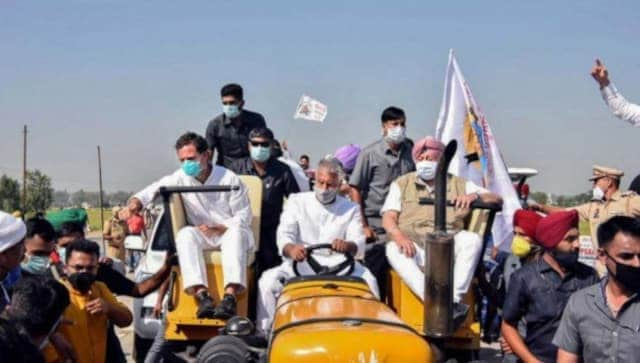Modi said in the Rajya Sabha that the Congress should take pride that he had to do what the former prime minister wanted

File image of Rahul Gandhi during a protest against the farm laws in Punjab. PTI
Prime Minister Narendra Modi, defending the Centre’s new agriculture-related laws in Parliament on Monday, quoted his predecessor Manmohan Singh on the need for reforms in the farm sector.
Modi said in the Rajya Sabha that the Congress should take pride that he had to do what the former prime minister wanted.
Interestingly, through these remarks, Modi was essentially repeating an argument that was first made by a prominent former spokesperson of the Congress party — Sanjay Jha.
In an article for The Times of India on 30 September, Jha (who had been suspended from the party less than three months earlier) had said that by opposing the farm laws, the Congress was “saying goodbye to Manmohanomics”.
He pointed that Congress had pitched for similar reforms as part of its 2019 poll promises, and opined that the party should instead claim the credit by citing its own manifesto commitment.
Indeed, Congress seems to be struggling to reconcile its present position with its earlier contradictory stands on the same issues.
A look back at the Congress’ manifesto for the 2019 Lok Sabha election helps to shed light on Jha’s contentions. In the document, the party had promised to replace the Essential Commodities Act by an enabling law that can be invoked only in the case of emergencies. The party had also promised to repeal the Agricultural Produce Market Committees (APMC) Act. The possible dismantling of the APMC system is precisely the fear that protesting farmers have expressed in response to the new laws.
However, Congress continues to stridently oppose the Centre’s three new farm laws. The party has set a timeline for its state units to launch campaigns against the legislation and report back to the central leadership.
KC Venugopal, Congress’ general secretary-in-charge of organisation, has also called for block-level conventions on the farm laws to be organised before 10 February.
An article by Hindustan Times also quotes a letter sent by Venugopal to state party chiefs as saying that they should organise district-level padayatras before 20 February.
It is also clear that Congress’ present position is to seek a complete rollback of the laws and not merely pushing for amendments to protect the interests of cultivators. The party’s foremost leader, Rahul Gandhi, said as much on 19 January, when he asserted at a press conference that the ‘only solution’ to the current impasse is repealing the legislations.
However, with the prime minister himself laying emphasis on the Congress’ own support for even more radical measures than the ones it is opposing now, the grand old party could find itself pushed to a corner.
Of course, Congress is not the only party that can be accused of political hypocrisy. As Sanjay Jha further pointed out in the article quoted above, the BJP is now allowing the very reforms that it vociferously opposed in the UPA years — such as FDI in multi-brand retail. The BJP, after coming to power, has also pushed ahead with UPA-era initiatives such as GST, Aadhaar, and MGNREGA, despite criticising them at that time.
Nevertheless, the BJP’s criticisms on foreign direct investment and MGNREGA are now much more distant memories, as compared to the Congress’ manifesto for the 2019 parliamentary polls. That, combined with the Congress’ present insistence on total repeal of the farm laws, makes the grand old party particularly vulnerable to charges of political opportunism.
Subscribe to Moneycontrol Pro at ₹499 for the first year. Use code PRO499. Limited period offer. *T&C apply
This article is auto-generated by Algorithm Source: www.firstpost.com


